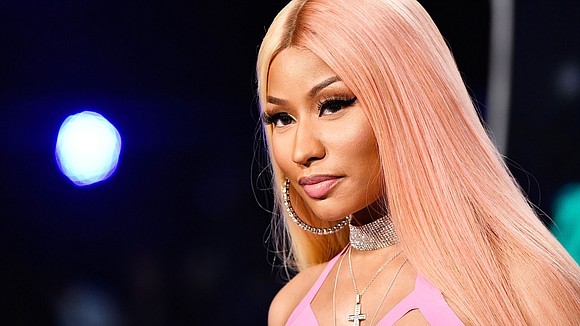As leaders struggle to dispel misinformation about vaccines, some celebrities create more
CNN/Stylemagazine.com Newswire | 9/16/2021, 10:48 a.m.

Originally Published: 14 SEP 21 19:04 ET
Updated: 16 SEP 21 10:47 ET
Analysis by Brandon Tensley, CNN
(CNN) -- Those Nicki Minaj tweets? Let's talk about them.
On Monday, Minaj said that her cousin in Trinidad, where the superstar is from, "won't get the vaccine cuz his friend got it & became impotent. His testicles became swollen."
There's no link between the Covid-19 vaccines and infertility, as the Centers for Disease Control and Prevention explained in August.
This unfounded fear isn't new, vaccine expert and pediatrician Dr. Yvonne Maldonado, the chief of Stanford University School of Medicine's division of pediatric infectious diseases, told CNN earlier this year.
"Oh my goodness, people have been saying this about every vaccine since I can remember," said Maldonado, who also chairs the American Academy of Pediatrics Committee on Infectious Diseases. "There is no evidence that this vaccine will affect development or fertility."
Minaj also suggested that she isn't vaccinated, saying that she's waiting until she feels that she's "done enough research."
During a televised briefing on Wednesday, Trinidad and Tobago Health Minister Dr. Terrence Deyalsingh said, "As we stand now, there is absolutely no reported such side effect or adverse event of testicular swelling in Trinidad," according to state-owned outlet TTT Limited.
CNN Chief Medical Correspondent Dr. Sanjay Gupta debunked the rapper's claim on New Day.
"The Journal of the Medical Association looked specifically at fertility issues and didn't find fertility issues," he said. "I appreciate her wanting to do the research. It's out there. I wish her cousin's friend well, but that's not related to the vaccine."
It can be easy, in some ways, to fret, to wonder: Could Minaj's tweets make a bad problem even worse? After all, across the country and across demographics, vaccine hesitancy, and outright vaccine refusal, remains a problem.
That line of thinking feels a bit rash, though, and maybe even misreads the broader dynamics of celebrity influence in politics.
Minaj is hardly the only celebrity whose sway has come under scrutiny -- and she certainly won't be the last.
According to Mark Harvey, the author of the 2018 book, "Celebrity Influence: Politics, Persuasion and Issue-Based Advocacy," there are generally two kinds of celebrity power: "the ability to 'spotlight' issues in the media and to persuade audiences."
Crucially, celebrities aren't persuasive all the time over all issues. Their influence is complicated by a variety of factors, such as their expertise, their affiliations with advocacy groups and their connection to the issue (think Ellen DeGeneres or Billy Porter on LGBTQ rights).
But Harvey argues that what we're seeing with the coronavirus pandemic, and specifically with Covid-19 vaccines, is completely different.
"The question is what happens when a celebrity is trying to persuade on a wedge issue, on something that people are so divided on that they're not going to change their minds, on issues like gun control and abortion? I think that we're having a moment like that," Harvey told CNN, adding that the cultural divide is far greater today than it was in the 1950s, when Elvis Presley could get a polio vaccine on "The Ed Sullivan Show" and convince skeptical teens to get inoculated.
"Nowadays, Nicki Minaj says something on certain issues, and it's probably not going to move the needle at all," Harvey said. "It's basically going to be people on the right saying, 'Go, Nicki Minaj. She's great.' And people on the left saying, 'She's a bad influence.' And that's probably the end of it."
This isn't to suggest that people are wrong for being irritated by Minaj's tweets. In not squarely supporting the trove of data demonstrating the safety and efficacy of Covid-19 vaccines, the rapper may have helped to muddy the waters at a time when clarity is urgent.
Black Americans and Latinos have been disproportionately sickened and hospitalized from Covid-19, and new research from Johns Hopkins University reveals that, in most states, both groups represent a smaller share of vaccinations than they do cases.
As Covid-19 increasingly becomes the pandemic of the unvaccinated, community leaders and health advocates are pleading for Americans to get the shot to prevent further devastation among already vulnerable populations. They've launched campaigns, planned and promoted more vaccine clinics, and even partnered with hair salons and barbershops in hopes of reaching more people who remain skeptical.
Some leaders and doctors say that they're struggling to dispel myths and misinformation about the vaccine that continue to spread in the Black community.
Dr. Jayne Morgan, the executive director of the Covid Task Force at the Piedmont Healthcare Corporation in Atlanta, said that Minaj was "scientifically irresponsible" in her tweets, and that it'd be more productive for Minaj to share information from doctors.
"(Her comments) make our work that much more difficult if we have to continue to battle misinformation," Morgan told CNN.
The White House has offered to connect Minaj with one of the Biden administration's doctors to answer questions about the Covid-19 vaccines, a White House official told CNN.
Of course, the issue is much, much bigger than Minaj. Joe Rogan, Rob Schneider, Chet Hanks: Many celebrities have criticized Covid-19 vaccines, or engaged with wild conspiracy theories. The work continues.



